
Observer's view: There's still a way to go to save Thames Water from financial oblivion Observer Editorial
Two crews in Saturday's traditional Oxford vs Cambridge boat race were warned about dangerous levels of E coli in the Thames. Any celebration, or worse, reversal, should have been avoided. Yet heavy rainfall in March has caused untreated sewage – human waste, sanitary products and wet wipes – to flow into the capital's rivers, mixing with London's old sewers to form more untreated, toxic sewage. This was a clear metaphor for the decline of Britain.
The same is happening across the UK, regardless of who owns the system – privately owned, as in England, or publicly owned, as in Scotland and Northern Ireland. Our predecessors did not want to invest in expensive separate sewerage and drainage systems, but as the climate changes and our population grows, we have to pay a heavy price. Last week, the Environment Agency revealed that discharges of untreated sewage into England's rivers and seas by England's water companies were to more than double in 2023, with above-average rainfall offered as an explanation. But the growing protests in England are also being echoed in Scotland and Northern Ireland: Do not swim in Lough NeaghFor example, or on the Antrim coast after heavy rain – you will be swimming in untreated sewage.
At the root of the crisis is a massive lack of investment in our water and drainage systems, going back more than a century, which Thatcherite extremists thought privatization would solve in one fell swoop. Privatize the English water companies, regardless of who owned them as long as it was not the state, relieve them of debts and, through light regulation, solve the problem of underinvestment Will be done. Private managers, incentivized by bonuses and profits, will bring efficiency savings and innovation that nationalized bureaucrats will not be able to do. Any borrowing would be off the government's balance sheet. Some in Thatcher's cabinet, such as then-Deputy Prime Minister Willie Whitelaw, thought this was privatization too far. Others, such as Nigel Lawson, described by Rishi Sunak as a “transformative” chancellor whose photo he hung over his Treasury desk as his first act as chancellor, dismissed Whitelaw's concerns. Gave. But Sunak, like almost every Tory, is beholden to a policy framework that has proven largely wrong.
Last week, privatized Thames Water revealed it had reached financial impasse, overwhelmed by £18bn of legacy debt as it was ruthlessly fleeced for exorbitant dividends under the ownership of a private consortium led by Australian investment bank Macquarie Was, which is synonymous with unacceptable. The face of capitalism. Its shareholders refuse to help repay the debt unless Thames is allowed to reduce water bills by 56% by 2030. The regulator, Ofwat, has refused without any concrete guarantees of an ongoing shareholder commitment to support Thames as it increases its investment levels. This is a promise that shareholders will not keep.
But Thames Water cannot be allowed to fail. It is indispensable – 16 million people depend on it. Neither Labor nor the Tories are suggesting its nationalization nor, given the records of Northern Ireland and Scotland, can this be seen as a long-term solution. Yet an unwillingness to develop viable structures for private ownership that the public would trust, along with mechanisms to ensure much higher investment, means the worst of all worlds. Opposition to nationalization would force Thames into short-term special administration into a hand-to-mouth existence based on cutting costs rather than investment. Private shareholders are unlikely to come forward to buy it back, without the reassurance that Ofwat has failed to give existing shareholders. But the government would like to ensure that this does not happen again. The Thames will be at a standstill.
Yet solutions exist. to build New “Super Sewer” This would dramatically reduce untreated sewage discharge, requiring Thames to create a stand-alone public benefit company, Tideway, to do this work. It fully complies with Ofwat's public value principles, is funded by private shareholders and its sole purpose is the construction and maintenance of sewers. During construction, the government has offered guarantees to Tideway against unexpected contingencies. Thames customers will have to pay an annual £25 surcharge on their bills for at least 20 years to cover construction costs and repay the loan. There is no Macquarie-style profiteering through offshore tax havens, excess dividends or huge bonuses – just the public and private sectors working together to create public value as their sole objective. The tunnel is scheduled to open in 2025.
This should be a model for the whole region, and presents an opportunity for Labour, if it has the ability to seize it. Every water company should be required by law to constitute itself as a public benefit company whose sole purpose is to provide cheap, clean water and related infrastructure. The UK Infrastructure Bank will provide contingent guarantees on loans taken to finance essential investments. Ofwat and the independent directors of the water companies will ensure that the proceeds of any price increases are dedicated to pursuing the sole purpose of the companies. Employees should be represented at board level and customers through statutorily established consumer challenge boards. At least a quarter of all shares must be publicly quoted on the London Stock Exchange to ensure transparency and accountability.
Will shareholders come forward? Returns will be similar to index-linked government securities: the days of bonus targets will be over. Some pension funds, insurance companies and specialist infrastructure funds would welcome this opportunity. The plight of the Thames is an opportunity for the UK to create a new asset class of purpose-led, publicly quoted, public benefit utilities by combining the private and the public. The craze may be disappointed – but that's just proof of the worth of the idea. Working time.



